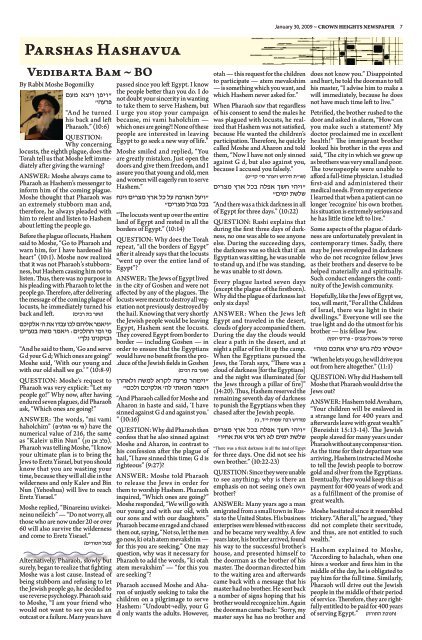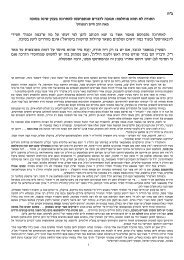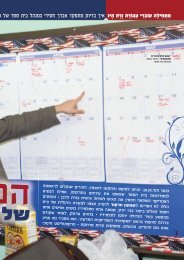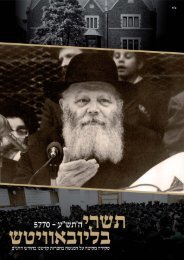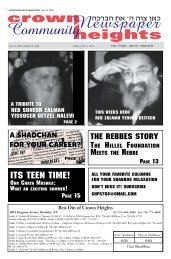A MIXER OR A MIKVEH?
A MIXER OR A MIKVEH?
A MIXER OR A MIKVEH?
- No tags were found...
You also want an ePaper? Increase the reach of your titles
YUMPU automatically turns print PDFs into web optimized ePapers that Google loves.
January 30, 2009 ~ crOWN heights Newspaper 7Parshas HashavuaVedibarta Bam ~ BOBy Rabbi Moshe Bogomilkyotah — this request for the childrento participate — atem mevakshim— is something which you want, andwhich Hashem never asked for.”When Pharaoh saw that regardlessof his consent to send the males hewas plagued with locusts, he realizedthat Hashem was not satisfied,because He wanted the children’sparticipation. Therefore, he quicklycalled Moshe and Aharon and toldthem, “Now I have not only sinnedagainst G d, but also against you,because I accused you falsely.”does not know you.” Disappointedand hurt, he told the doorman to tellhis master, “I advise him to make awill immediately, because he doesnot have much time left to live.”Petrified, the brother rushed to thedoor and asked in alarm, “How canyou make such a statement? Mydoctor proclaimed me in excellenthealth!” The immigrant brotherlooked his brother in the eyes andsaid, “The city in which we grew upas brothers was very small and poor.The townspeople were unable toafford a full-time physician. I studiedfirst-aid and administered theirmedical needs. From my experienceI learned that when a patient can nolonger ‘recognize’ his own brother,his situation is extremely serious andhe has little time left to live.”Some aspects of the plague of darknessare unfortunately prevalent incontemporary times. Sadly, theremay be Jews enveloped in darknesswho do not recognize fellow Jewsas their brothers and deserve to behelped materially and spiritually.Such conduct endangers the continuityof the Jewish community.Hopefully, like the Jews of Egypt we,too, will merit, “For all the Childrenof Israel, there was light in theirdwellings.” Everyone will see thetrue light and do the utmost for hisbrother — his fellow Jew.)מיוסד על אשכול ענבים - פרדס יוסף("כשלחו כלה גרש יגרש אתכם מזה")שו"ת תירוש ויצהר סי' קי"ט("ויהי חשך אפלה בכל ארץ מצריםשלשת ימים"“And there was a thick darkness in allof Egypt for three days.” (10:22)QUESTION: Rashi explains thatduring the first three days of darkness,no one was able to see anyoneelse. During the succeeding days,the darkness was so thick that if anEgyptian was sitting, he was unableto stand up, and if he was standing,he was unable to sit down.Every plague lasted seven days(except the plague of the firstborn).Why did the plague of darkness lastonly six days?ANSWER: When the Jews leftEgypt and traveled in the desert,clouds of glory accompanied them.During the day the clouds wouldclear a path in the desert, and atnight a pillar of fire lit up the camp.When the Egyptians pursued theJews, the Torah says, “There was acloud of darkness [for the Egyptians]and the night was illuminated [forthe Jews through a pillar of fire]”(14:20). Thus, Hashem reserved theremaining seventh day of darknessto punish the Egyptians when theychased after the Jewish people.)מדרש רבה שמות י"ד, ג'("ויהי חשך אפלה בכל ארץ מצריםשלשת ימים לא ראו איש את אחיו""ויפן ויצא מעםפרעה"“And he turnedhis back and leftPharaoh.” (10:6)QUESTION:Why concerninglocusts, the eighth plague, does theTorah tell us that Moshe left immediatelyafter giving the warning?ANSWER: Moshe always came toPharaoh as Hashem’s messenger toinform him of the coming plague.Moshe thought that Pharaoh wasan extremely stubborn man and,therefore, he always pleaded withhim to relent and listen to Hashemabout letting the people go.Before the plague of locusts, Hashemsaid to Moshe, “Go to Pharaoh andwarn him, for I have hardened hisheart” (10:1). Moshe now realizedthat it was not Pharaoh’s stubbornness,but Hashem causing him not tolisten. Thus, there was no purpose inhis pleading with Pharaoh to let thepeople go. Therefore, after deliveringthe message of the coming plague oflocusts, he immediately turned his(שער בת רבים) left. back and"ויאמר אליהם לכו עבדו את ה' אלקיכםמי ומי ההלכים: ויאמר משה בנערינוובזקנינו נלך"“And he said to them, ‘Go and serveG d your G d; Which ones are going?’Moshe said, ‘With our young andwith our old shall we go.’ ” (10:8-9)QUESTION: Moshe’s request toPharaoh was very explicit: “Let mypeople go!” Why now, after havingendured seven plagues, did Pharaohask, “Which ones are going?”ANSWER: The words, “mi vamihaholchim” ומי ההלכים) (מי have thenumerical value of 216, the same.(כלב ובן נון) Nun” as “Kaleiv uBinPharaoh was telling Moshe, “I knowyour ultimate plan is to bring theJews to Eretz Yisrael, but you shouldknow that you are wasting yourtime, because they will all die in thewilderness and only Kalev and BinNun (Yehoshua) will live to reachEretz Yisrael.”Moshe replied, “Binareinu uvizkeineinuneileich” — “Do not worry, allthose who are now under 20 or over60 will also survive the wildernessand come to Eretz Yisrael.”)בעל הטורים(Alternatively, Pharaoh, slowly butsurely, began to realize that fightingMoshe was a lost cause. Instead ofbeing stubborn and refusing to letthe Jewish people go, he decided touse reverse psychology. Pharaoh saidto Moshe, “I am your friend whowould not want to see you as anoutcast or a failure. Many years havepassed since you left Egypt. I knowthe people better than you do. I donot doubt your sincerity in wantingto take them to serve Hashem, butI urge you stop your campaignbecause, mi vami haholchim —which ones are going?! None of thesepeople are interested in leavingEgypt to go seek a new way of life.”Moshe smiled and replied, “Youare greatly mistaken. Just open thedoors and give them freedom, and Iassure you that young and old, menand women will eagerly run to serveHashem.”"ויעל הארבה על כל ארץ מצרים וינחבכל גבול מצרים"“The locusts went up over the entireland of Egypt and rested in all theborders of Egypt.” (10:14)QUESTION: Why does the Torahrepeat, “all the borders of Egypt”after it already says that the locusts“went up over the entire land ofEgypt”?ANSWER: The Jews of Egypt livedin the city of Goshen and were notaffected by any of the plagues. Thelocusts were meant to destroy all vegetationnot previously destroyed bythe hail. Knowing that very shortlythe Jewish people would be leavingEgypt, Hashem sent the locusts.They covered Egypt from border toborder — including Goshen — inorder to ensure that the Egyptianswould have no benefit from the pro-.duce of the Jewish fields in Goshen)שער בת רבים("וימהר פרעה לקרא למשה ולאהרןויאמר חטאתי לה' אלקיכם ולכם"“And Pharaoh called for Moshe andAharon in haste and said, ‘I havesinned against G d and against you.’” (10:16)QUESTION: Why did Pharaoh thenconfess that he also sinned againstMoshe and Aharon, in contrast tohis confession after the plague ofhail, “I have sinned this time; G d isrighteous” (9:27)?ANSWER: Moshe told Pharaohto release the Jews in order forthem to worship Hashem. Pharaohinquired, “Which ones are going?”Moshe responded, “We will go withour young and with our old, withour sons and with our daughters.”Pharaoh became enraged and chasedthem out, saying, “Not so, let the mengo now, ki otah atem mevakshim —for this you are seeking.” One mayquestion, why was it necessary forPharaoh to add the words, “ki otahatem mevakshim” — “for this youare seeking”?Pharaoh accused Moshe and Aharonof unjustly seeking to take thechildren on a pilgrimage to serveHashem: “Undoubt¬edly, your Gd only wants the adults. However,“There was a thick darkness in all the land of Egyptfor three days. One did not see hisown brother.” (10:22-23)QUESTION: Since they were unableto see anything; why is there anemphasis on not seeing one’s ownbrother?ANSWER: Many years ago a manemigrated from a small town in Russiato the United States. His businessenterprises were blessed with successand he became very wealthy. A fewyears later, his brother arrived, foundhis way to the successful brother’shouse, and presented himself tothe doorman as the brother of hismaster. The doorman directed himto the waiting area and afterwardscame back with a message that hismaster had no brother. He sent backa number of signs hoping that hisbrother would recognize him. Againthe doorman came back: “Sorry, mymaster says he has no brother and“When he lets you go, he will drive youout from here altogether.” (11:1)QUESTION: Why did Hashem tellMoshe that Pharaoh would drive theJews out?ANSWER: Hashem told Avraham,“Your children will be enslaved ina strange land for 400 years andafterwards leave with great wealth”(Bereishit 15:13-14). The Jewishpeople slaved for many years underPharaoh without any compensa¬tion.As the time for their departure wasarriving, Hashem instructed Mosheto tell the Jewish people to borrowgold and silver from the Egyptians.Eventually, they would keep this aspayment for 400 years of work andas a fulfillment of the promise ofgreat wealth.Moshe hesitated since it resembledtrickery. “After all,” he argued, “theydid not complete their servitude,and thus, are not entitled to suchwealth.”Hashem explained to Moshe,“According to halachah, when onehires a worker and fires him in themiddle of the day, he is obligated topay him for the full time. Similarly,Pharaoh will drive out the Jewishpeople in the middle of their periodof service. Therefore, they are rightfullyentitled to be paid for 400 years(חנוכת התורה) Egypt.” of serving


